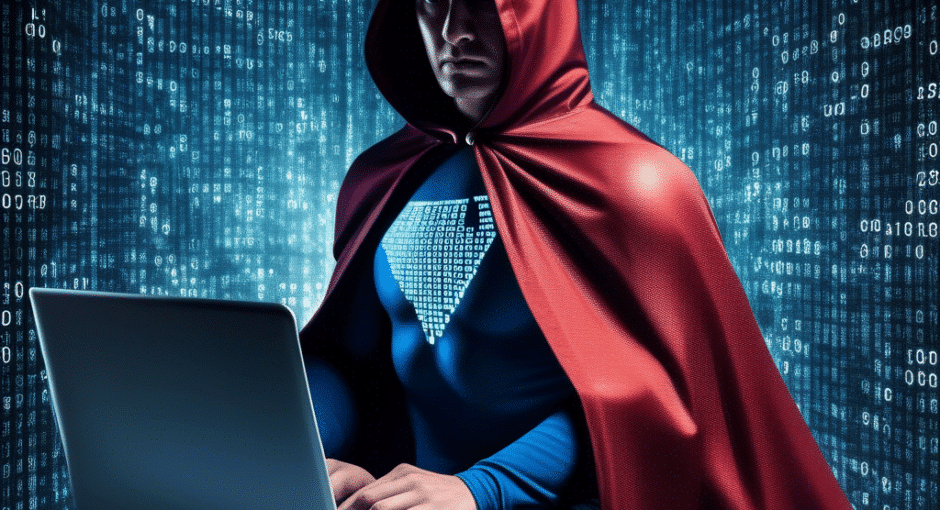In today’s digital age, cybersecurity has become more important than ever before. With the ever-increasing number of cyber threats and attacks, it is crucial for individuals to stay one step ahead and protect themselves from potential dangers. Whether you are a college student, a working professional, or simply someone who uses technology on a daily basis, incorporating cybersecurity practices into your daily routine is essential. This article aims to provide you with essential cybersecurity tips that can help you stay safe and secure in the digital realm. From empowering end users with everyday practices to highlighting the importance of cybersecurity education, we will explore various strategies to ensure your online safety. So, let’s dive in and discover how you can protect yourself from cyber threats and become a savvy user in today’s digital world.
- 1. "Stay One Step Ahead: Essential Cybersecurity Tips for Daily Protection"
- 2. "Empowering End Users: Strengthening Cybersecurity with Everyday Practices"
- 3. "Knowledge is Power: The Importance of Cybersecurity Education in Today’s Digital World"
1. "Stay One Step Ahead: Essential Cybersecurity Tips for Daily Protection"
In today’s digital age, cybersecurity has become more important than ever. With cyber threats constantly evolving, it is crucial for individuals to stay one step ahead in order to protect their personal information and devices. By following essential cybersecurity tips on a daily basis, you can significantly reduce the risk of falling victim to cyber attacks and ensure your online safety.
1. Keep Your Software Updated:
One of the simplest yet most effective ways to enhance your cybersecurity is to regularly update your software. This includes your operating system, web browsers, antivirus software, and all other applications. Software updates often contain patches and fixes for security vulnerabilities, which hackers can exploit to gain unauthorized access to your devices. By keeping your software up to date, you can close these loopholes and prevent potential attacks.
2. Create Strong and Unique Passwords:
Passwords are the first line of defense against unauthorized access to your online accounts. Many people make the mistake of using weak and easily guessable passwords, such as their birthdate or "password123." To strengthen your passwords, use a combination of uppercase and lowercase letters, numbers, and special characters. Additionally, use a unique password for each of your accounts to minimize the impact of a potential data breach.
3. Enable Two-Factor Authentication:
Two-factor authentication (2FA) adds an extra layer of security to your online accounts. With 2FA, you will need to provide a second form of verification, such as a fingerprint scan or a unique code sent to your mobile device, in addition to your password. This ensures that even if your password is compromised, unauthorized individuals still cannot access your accounts without the second factor of authentication.
4. Be Cautious of Phishing Attacks:
Phishing attacks are a common method used by cybercriminals to trick individuals into revealing sensitive information, such as login credentials or credit card details. These attacks often come in the form of deceptive emails, text messages, or websites that appear legitimate. To protect yourself, be cautious of unsolicited emails or messages asking for personal information, and avoid clicking on suspicious links. Always verify the legitimacy of requests before providing any sensitive data.
5. Regularly Back Up Your Data:
Data loss can occur due to various reasons, including malware infections, hardware failures, or accidental deletions. To safeguard your important files and documents, it is crucial to regularly back up your data. This can be done using external hard drives, cloud storage services, or backup software. By having a recent backup, you can easily restore your files in case of any data loss event.
6. Stay Educated:
Cybersecurity threats are constantly evolving, and it is important to stay educated about the latest trends and best practices. Take advantage of cybersecurity education resources available online, such as blogs, podcasts, and webinars. Stay informed about common attack methods, emerging threats, and recommended security measures. By staying educated, you can proactively protect yourself and adapt to the ever-changing cybersecurity landscape.
By implementing these essential cybersecurity tips into your daily routine, you can significantly enhance your online safety and protect your personal information. Remember, cybersecurity is a continuous effort, and staying one step ahead is essential in this digital age. Stay vigilant, stay informed, and prioritize your end user security.
2. "Empowering End Users: Strengthening Cybersecurity with Everyday Practices"
In today’s digital age, cybersecurity has become a crucial aspect of our daily lives. With cyber threats becoming increasingly sophisticated, it is essential for individuals to be equipped with the knowledge and tools to protect themselves online. This is where empowering end users and strengthening cybersecurity with everyday practices comes into play.
End users, or everyday individuals who use technology, play a vital role in the overall cybersecurity landscape. While organizations and IT professionals work tirelessly to secure networks and systems, it is ultimately the end users who can make or break the security of their personal information.
One of the most effective ways to empower end users and enhance cybersecurity is through education. By providing individuals with the necessary knowledge and skills, they can make informed decisions and adopt best practices when it comes to their online activities. Cybersecurity education should cover a wide range of topics, including password hygiene, phishing awareness, safe browsing habits, and the importance of software updates.
Password hygiene is a fundamental aspect of cybersecurity. Individuals should be educated on the importance of using strong, unique passwords for each online account. Additionally, they should be encouraged to enable two-factor authentication whenever possible, as it adds an extra layer of security.
Phishing attacks continue to be one of the most common methods used by cybercriminals to gain unauthorized access to personal information. End users should be trained to recognize the signs of a phishing attempt, such as suspicious emails asking for sensitive information or links to unfamiliar websites. By being vigilant and cautious, individuals can avoid falling victim to these attacks.
Safe browsing habits are another critical aspect of everyday cybersecurity practices. End users should be aware of the risks associated with visiting untrustworthy websites or downloading files from unknown sources. Regularly updating software and applications is also essential, as these updates often include security patches that address vulnerabilities.
In addition to education, organizations can further empower end users by implementing user-friendly security measures. This includes providing easy-to-use tools for password management, offering secure file sharing options, and promoting the use of virtual private networks (VPNs) for remote access.
By empowering end users and strengthening cybersecurity through everyday practices, we can collectively create a safer online environment. Education is key in equipping individuals with the knowledge and skills to protect themselves from cyber threats. As technology continues to advance, it is crucial that we prioritize end user security and work together to stay one step ahead of cybercriminals.
3. "Knowledge is Power: The Importance of Cybersecurity Education in Today’s Digital World"
In today’s digital world, where cyber threats are becoming increasingly sophisticated and prevalent, it is crucial for individuals to arm themselves with the knowledge and skills necessary to protect their personal and professional information. Cybersecurity education plays a vital role in equipping individuals with the necessary tools to navigate the online landscape securely.
One of the key reasons why cybersecurity education is essential is the ever-evolving nature of cyber threats. Hackers and cybercriminals are constantly finding new ways to breach security systems and gain unauthorized access to sensitive information. By staying informed about the latest trends and techniques in cybersecurity, individuals can stay one step ahead of these threats and take proactive measures to protect themselves.
Moreover, end user security is a critical aspect of overall cybersecurity. End users, who are often the weakest link in the security chain, can inadvertently expose their organizations to cyber threats through actions such as clicking on malicious links or sharing sensitive information with unauthorized individuals. By educating end users about the importance of cybersecurity and providing them with the necessary knowledge and skills, organizations can significantly reduce the risk of cyber attacks.
Cybersecurity education also empowers individuals to make informed decisions regarding their online activities. With the increasing reliance on technology in both personal and professional spheres, it is essential for individuals to understand the potential risks associated with various online actions. By learning about best practices for password management, safe browsing habits, and secure communication methods, individuals can take proactive steps to protect their digital identities and sensitive information.
Furthermore, cybersecurity education fosters a culture of security awareness. When individuals are educated about the importance of cybersecurity, they are more likely to adopt secure behaviors and practices in their daily routines. This not only benefits them personally but also contributes to a safer online environment for everyone.
In conclusion, in today’s digital world, where cyber threats are rampant, cybersecurity education is paramount. It provides individuals with the knowledge, skills, and awareness necessary to navigate the online landscape securely and protect their personal and professional information. By investing in cybersecurity education, individuals can effectively defend against cyber threats and contribute to a safer digital society.
In a world where technology is constantly advancing, cybersecurity has become more important than ever. As we navigate the digital landscape, it is crucial that we stay one step ahead of cyber threats. This article has provided essential daily tips to protect ourselves and empower end users to take charge of their own cybersecurity. By implementing these practices, such as regularly updating software, using strong passwords, and being cautious of phishing attempts, we can significantly reduce the risk of falling victim to cyber attacks.
Furthermore, this article emphasizes the significance of cybersecurity education. In today’s digital world, knowledge truly is power. By educating ourselves and others about the latest threats and best practices, we can create a safer online environment for everyone.
As an IT professional, I strongly believe that cybersecurity is a shared responsibility. It is not just the job of cybersecurity experts or IT departments, but it is also the responsibility of every individual who uses technology. By taking proactive measures and staying informed, we can collectively strengthen our defenses against cyber threats.
In conclusion, cybersecurity should not be taken lightly. It is a continuous effort that requires our attention and commitment on a daily basis. By following the tips outlined in this article and investing in cybersecurity education, we can protect ourselves, our personal information, and our digital assets from cyber attacks. Let us stay vigilant, empower ourselves and others, and create a safer digital world for everyone.






